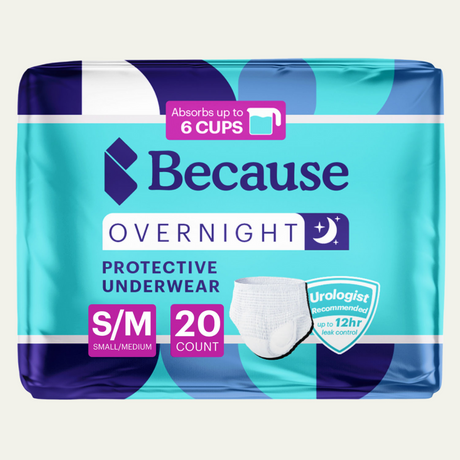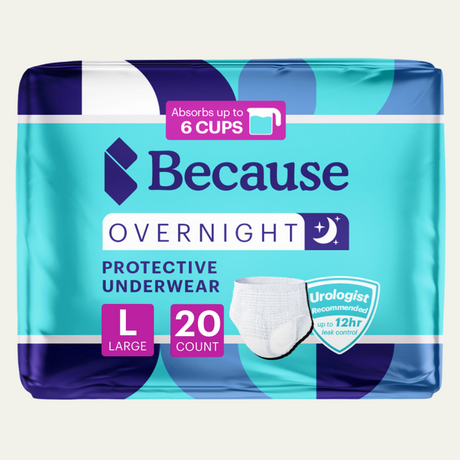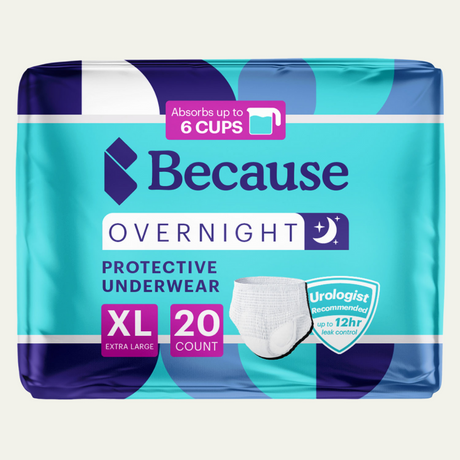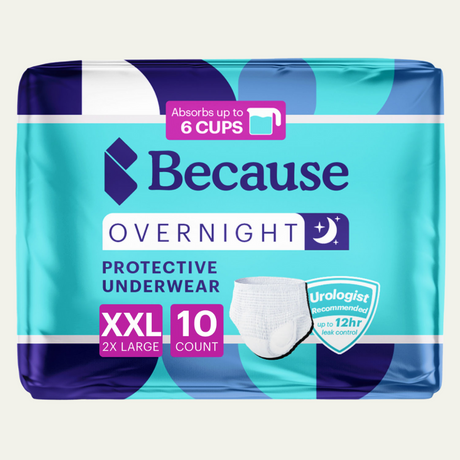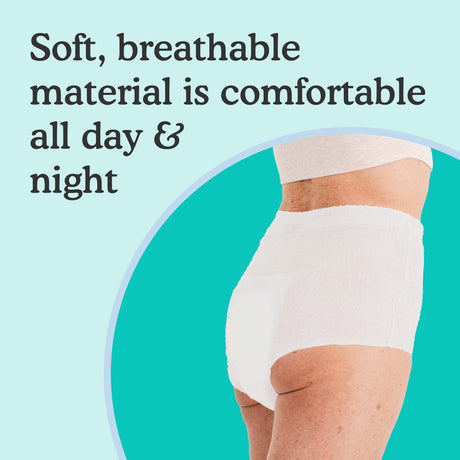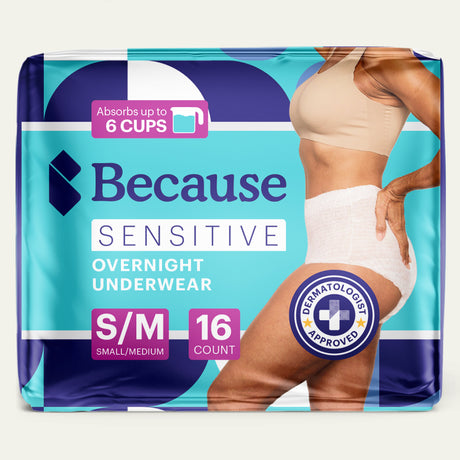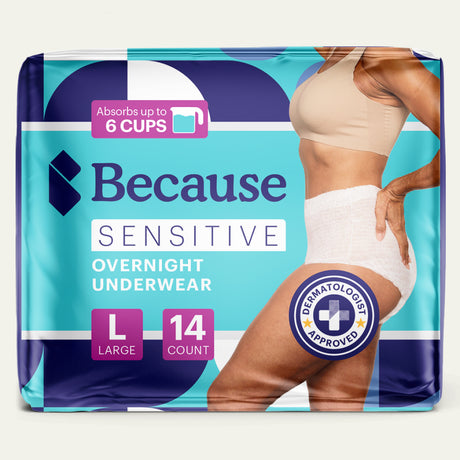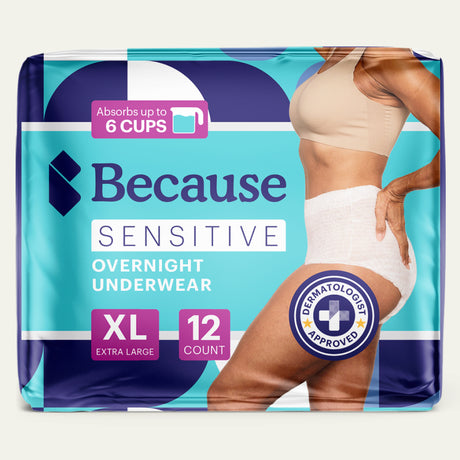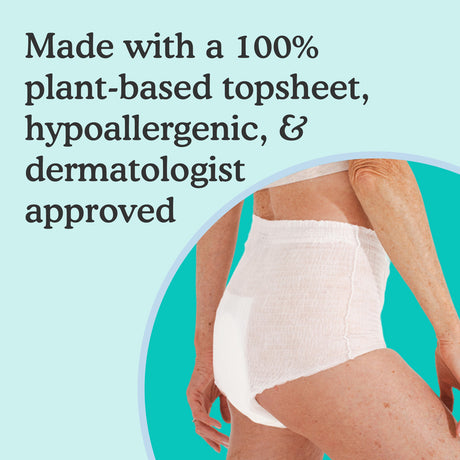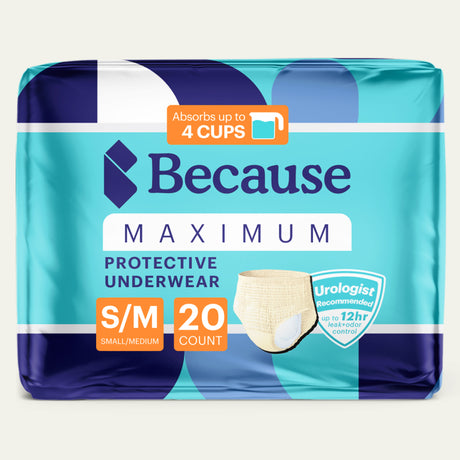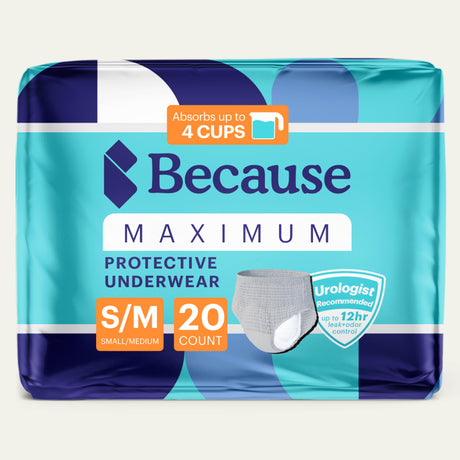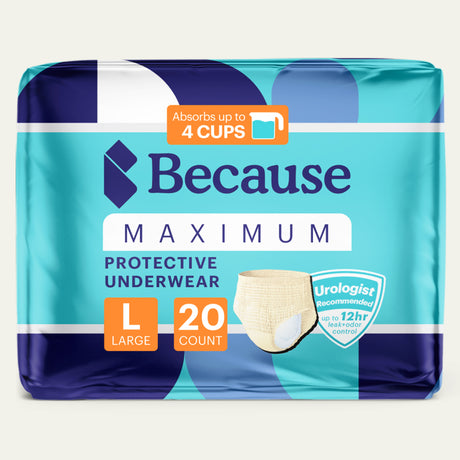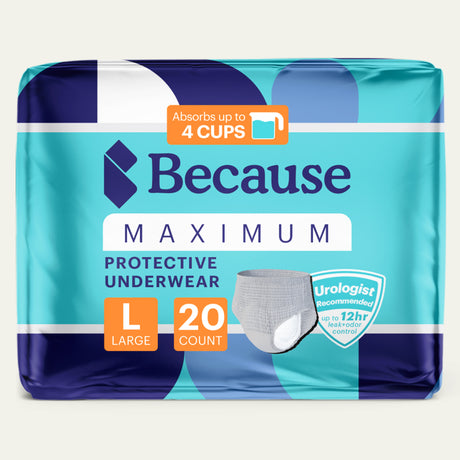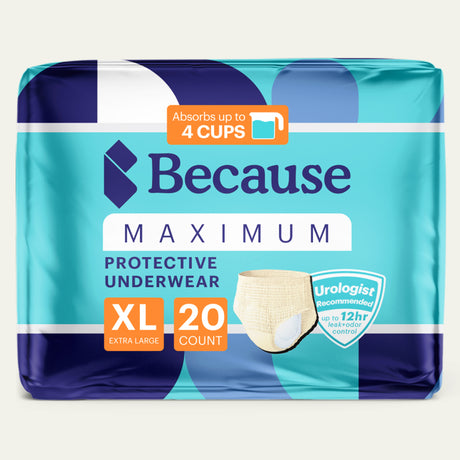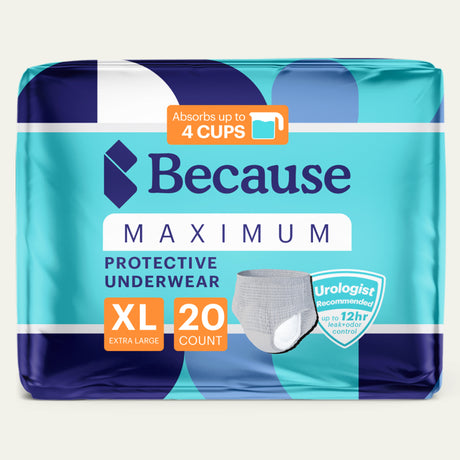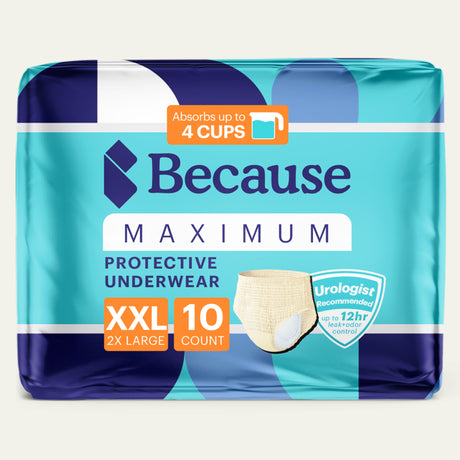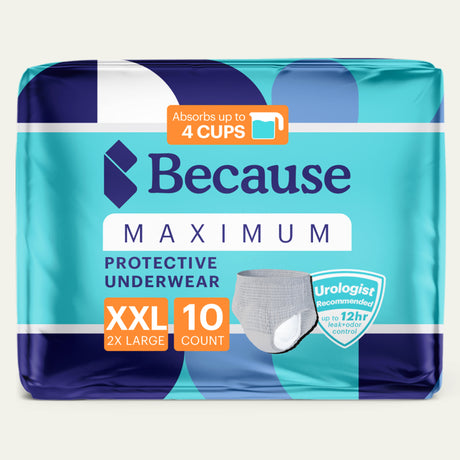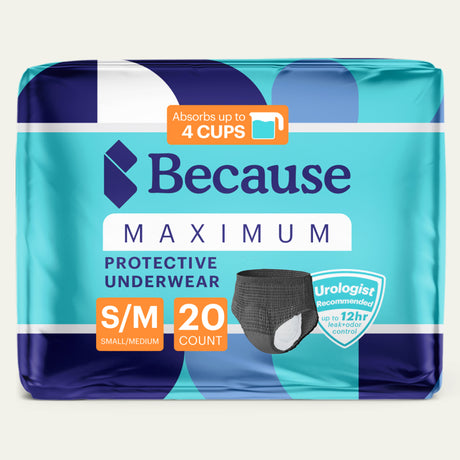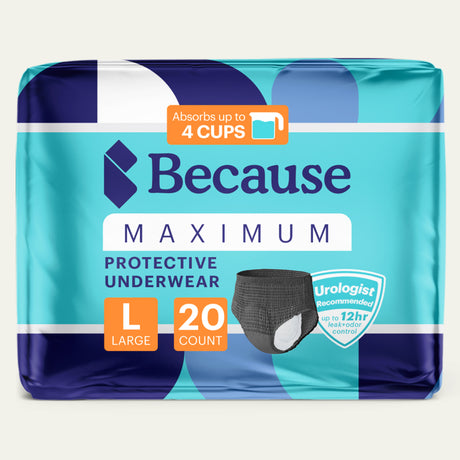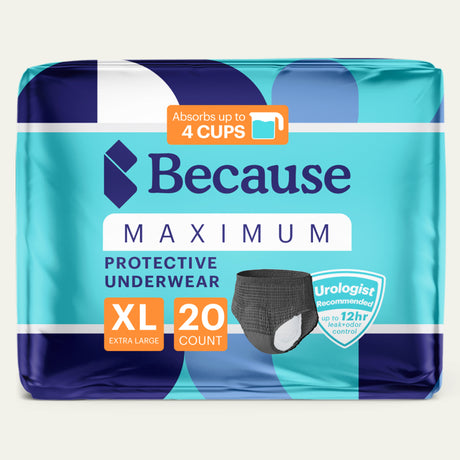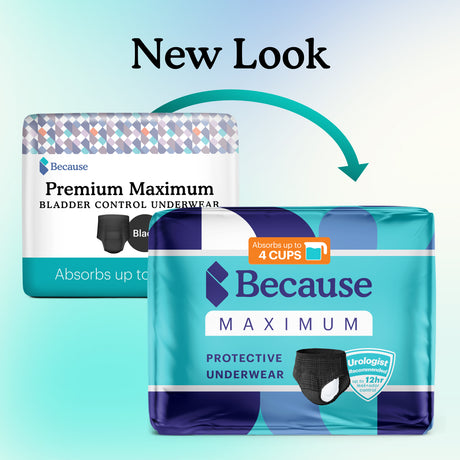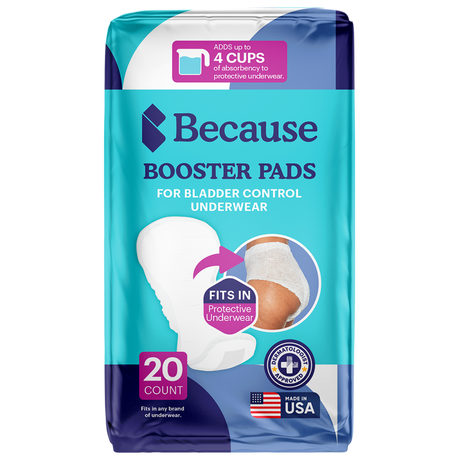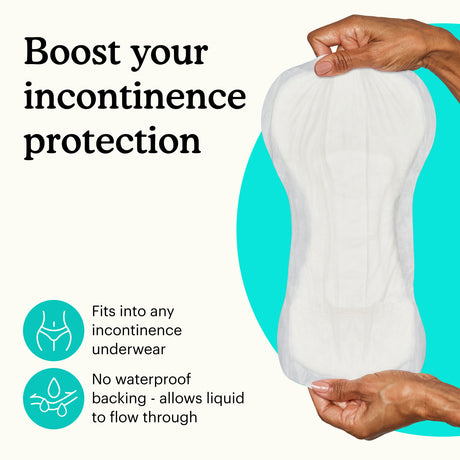Caring for your bladder and the rest of your urinary system is vital at any age. In this post, you’ll learn why bladder health is essential to overall health and how to support your urinary system while addressing symptoms of bladder issues.
Anatomy of the Bladder and Urinary System
Your urinary system consists of four main parts: kidneys, bladder, ureters, and urethra. Let’s take a look at each piece.
Kidneys
The kidneys are two bean-shaped organs in your lower back below your ribs. Blood passes through the kidneys as it circulates throughout the body. The excess fluid and waste products get mixed with urea produced by the kidneys to create urine.
Bladder
The bladder is a balloon-like organ located below your kidneys. Its job is to collect urine and hold it until it’s time for it to leave your body. When your bladder gets full, nerves send a message to your brain, telling you it’s time to urinate.
Ureters
Ureters are two thin tubes that connect your kidneys to the bladder. After the kidneys produce urine, the urine moves through the ureters and arrives in the bladder for storage.
Urethra
The urethra is a tube that travels from your bladder to the outside of your body. In women, the urethra’s opening is in front of the vagina. In men, the opening of the urethra is at the tip of the penis.
When it’s time to go to the bathroom, you relax the muscles that support your bladder, known as the pelvic floor muscles. This process softens the bladder muscles and causes two rubber-band-like muscles (called the sphincters) to widen. Once the sphincters open up, urine flows out of the bladder through your urethra and into the toilet.
The Importance of a Healthy Bladder
Having a healthy bladder helps your body eliminate excess fluid and waste. Plus, it supports your kidneys so they can work properly. When functioning well, your kidneys:
- Assist with blood pressure control: Your kidneys help produce hormones that keep blood pressure levels in check. Healthy blood pressure can lower your risk of heart disease, heart attack, and stroke.
- Regulate electrolytes: Electrolytes are salts that conduct electrical energy through your body. They help your muscles move and keep your blood acidity in the ideal range while ensuring your body maintains a healthy fluid balance.
- Maintain healthy bones: When your kidneys work properly, they can efficiently remove excess phosphorus from the body. Too much phosphorus in your body can lead to a loss of calcium that weakens bones.
- Aid in red blood cell production: Red blood cells carry oxygen throughout your body to help every system work properly. The kidneys produce hormones that are necessary for producing red blood cells.
Factors That Affect Bladder and Urinary Health

Understanding what can affect this organ and the rest of your urinary system is essential to keeping your bladder healthy. Let’s examine some things that can help or hurt your bladder health.
Diet and Hydration
Like the rest of your body, your bladder and urinary system require nutrients from food to function properly. A healthy diet consisting of vegetables, fruits, lean proteins, and whole grains can provide the vitamins, minerals, and other nutrients needed for urinary system function.
Consuming enough fluids is vital for your urinary health, as adequate fluid intake supports urine production. Urination is essential for removing waste from your body and flushing out bacteria that can cause urinary tract infections.
If you’re dehydrated because you don't drink enough water and other fluids, you may not urinate often enough to eliminate waste efficiently. Plus, your urine can become more concentrated, opening the doors to bladder irritation.
Smoking and Alcohol Consumption
Smoking and drinking alcohol can both cause bladder problems. There are more than 7,000 chemicals in tobacco smoke, and many can damage cells and trigger inflammation in the body. Cigarette smoke can also cause cells in the bladder to become abnormal, leading to bladder cancer. Smoking makes you three times more likely to develop bladder cancer than someone who doesn’t smoke.
Alcohol can irritate the bladder, leading to abdominal pain and increased urinary urgency. In addition, alcohol is a diuretic — a substance that increases urine production. As a result, it makes you urinate more frequently. People who suffer from one of the types of urinary incontinence may be more likely to experience urine leakage and loss of bladder control when they drink alcoholic beverages.
Weight
Being overweight or obese can negatively impact your bladder. Extra weight puts pressure on the bladder muscles, weakening them over time. This effect can also worsen symptoms of urinary problems (like overactive bladder and incontinence). One study found that women who lost just 5% to 10% of their total body fat saw a significant decrease in urine leakage.
Certain Medical Conditions
Some chronic conditions can damage the urinary system or interfere with kidney and bladder function. Examples include:
- Diabetes
- High blood pressure (especially if uncontrolled)
- Lupus
- Genetic conditions like Alport syndrome
- Parkinson’s disease
- Multiple sclerosis
- Nerve damage caused by a stroke or other issue
- Enlarged prostate in men
In women, childbirth and menopause also affect the urinary system. Both can weaken the pelvic floor muscles, reducing the bladder's support and increasing the risk of incontinence. Additionally, hormonal changes after menopause can make the bladder and urethra more vulnerable to bacteria that cause urinary tract infections.
How to Keep Your Bladder and Urinary System Healthy
Now, it’s time to explore how to keep your urinary system healthy. Remember, these lifestyle changes may take time to produce noticeable results if you have bladder conditions like incontinence.
Avoid Bladder-Irritating Foods

Alcohol isn’t the only thing that can irritate your bladder. Many other foods and drinks trigger inflammation, such as:
- Caffeine in coffee, tea, soda, and energy drinks
- Chili peppers and other spicy foods
- Fatty and fried foods like French fries, cheese, and bacon
- Acidic foods and beverages like citrus fruits, tomatoes, orange juice, and vinegar
- MSG and other food additives and preservatives used in both restaurants and processed foods
- Artificial sweeteners found in zero-calorie beverages and some processed foods
Not everyone is sensitive to all bladder-irritating foods. Keep a food diary to track what you eat and what symptoms you experience to identify which foods you want to avoid.
Hydrate Regularly with the Right Fluids
Monitoring how much fluid you consume every day is essential for urinary health. If you suffer from urinary incontinence, you’ll need to drink enough to stay hydrated — but not so much that your incontinence symptoms worsen.
Choosing the correct fluids is as important as drinking enough for all individuals. Water is generally the best option, but you can also drink herbal teas, cranberry juice, and other fruit juices with low acidity and no artificial sweeteners or sugars added.
Your healthcare provider can advise you on how much water to drink daily. Foods that contain water can also help you get the amount of fluids your doctor recommends. Examples include soup, celery, fruits like watermelon, and cruciferous vegetables like broccoli, cauliflower, and leafy greens.
Take Bladder Health Supplements
Bladder health supplements can complete a healthy diet while supporting urinary function with vitamins, minerals, and other vital ingredients. Some are formulated for overall bladder health, while others have specific benefits. For example, you can find UTI supplements with ingredients that may help prevent a bladder infection (like cranberry extract and supplements that reduce urinary frequency and other symptoms of an overactive bladder).
Strengthen Your Pelvic Floor
As previously mentioned, your pelvic floor muscles help to support your bladder and can reduce the risk of leakage if you have urinary incontinence. Daily exercises can restore tone and strength to stretched and weakened muscles. A physical therapist can introduce you to techniques for building pelvic floor strength (like kegel exercises) and teach you how to do pelvic floor exercises at home.
Maintain a Healthy Weight
If you’re overweight, losing a small amount of body fat could benefit your urinary health. For weight management:
- Eat a balanced diet that includes fruits, vegetables, whole grains, and lean protein.
- Pay attention to portion size to prevent overeating.
- Consume plenty of high-fiber foods to help you feel full.
- Get regular physical activity to burn calories and strengthen your muscles.
- Limit your intake of highly processed foods and drinks that contain large amounts of sugar.
- Consider seeing a registered dietician who can develop a weight loss eating plan specifically for you.
Wear Cotton Underwear
Reducing your risk of urinary tract infections is part of promoting a healthy bladder. If you’re prone to urinary tract infections, choose cotton underwear over synthetic fabrics. The breathable material encourages drier skin to reduce the risk of bacterial growth in the genital area. Also, choose underwear that fits appropriately and avoid thongs and G-strings, which irritate the urethra and surrounding tissue.
Practice Good Hygiene and Toileting Habits

Good hygiene and toileting habits can reduce the risk of irritation and bacterial infections. Follow these tips to support a healthy bladder and urinary tract:
- Go to the bathroom when you get the urge rather than holding it.
- Take regular bathroom breaks, and try to empty your bladder twice before getting up from the toilet seat.
- Wipe from front to back to avoid introducing bacteria from your rectum into your urethra.
- Urinate after sexual activity to flush out your urethra.
- Change incontinence pads or underwear following an accident or leak as soon as possible.
- Use gentle cleansing wipes or a cleansing spray to clean your private area if you use incontinence protection products.
- Avoid harsh soaps, cleaners, and feminine care products which irritate the skin.
- Wash your hands before and after you go to the bathroom.
Coping with Bladder and Urinary Issues

If you have bladder or urinary issues, follow these tips to help manage your symptoms.
Partner with Your Health Care Provider
Don’t be afraid to tell your doctor about incontinence or other urinary symptoms. Many people suffer from incontinence, and health professionals can recommend treatments to help you manage symptoms.
Boost Your Confidence with Incontinence Protection
Incontinence underwear, pads, and guards absorb urine to prevent embarrassing leaks. Choose a product with the right absorbency level in the correct size for your needs. Carry disposable waste bags when you’re out and about to make changes in public bathrooms easier.
Read more about proper disposal of incontinence products.
Protect Your Skin
Incontinence can cause painful skin irritation. Proper hygiene can reduce the risk of this occurring and further lower the likelihood of diaper rashes with a barrier cream. It forms a protective layer over your skin to shield it from urine while sealing in moisture for faster healing.
Talk to Others
Too many people see bladder and urinary issues as secrets. It’s a medical condition you don’t have to be ashamed of, and discussing your feelings and experiences with others can help you cope.
If you're struggling with incontinence, join one of our private support groups today!
Women's Incontinence Support Group
Men's Incontinence Support Group
Looking for bladder supplements? Check out Because Market’s high-quality dietary supplements with products for reducing UTIs, controlling overactive bladder symptoms, and more.
Sources:
Centers for Disease Control and Prevention. (2021). High Blood Pressure. https://www.cdc.gov/bloodpressure/facts.htm
National Institute of Diabetes and Digestive and Kidney Diseases. (n.d.). Mineral and Bone Disorder in Kidney Disease. https://www.niddk.nih.gov/health-information/kidney-disease/mineral-bone-disorder
National Institute of Diabetes and Digestive and Kidney Diseases. (n.d.). Anemia in Kidney Disease and Dialysis. https://www.niddk.nih.gov/health-information/kidney-disease/anemia
National Cancer Institute. (2021). Smoking and Tobacco Use: Cessation Fact Sheet. https://www.cancer.gov/about-cancer/causes-prevention/risk/tobacco/cessation-fact-sheet
American Cancer Society. (2021). Bladder Cancer Risk Factors. https://www.cancer.org/cancer/bladder-cancer/causes-risks-prevention/risk-factors.html
Alashkham, A., & Patki, P. (2010). The Role of Smoking in Lower Urinary Tract Symptoms and Sexual Dysfunction in Men and Women: A Multicenter Parallel-Group Study Using 4 Validated Questionnaires. National Center for Biotechnology Information. https://www.ncbi.nlm.nih.gov/pmc/articles/PMC3038422/


